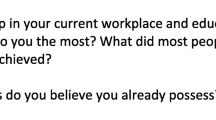Abstract
The purpose of this study is to determine the relative frequency of course offerings on social issues and business ethics in American business schools. Specifically, a random sample of the curricula of 119 American business schools were analyzed in order to gauge the importance given to coursework on ethics and social issues. The findings indicated that the incidence of such courses was generally low in American business curricula, particularly at the graduate level. These findings are discussed in light of the current concern for more responsible corporate behavior.
Similar content being viewed by others
References
American Assembly of Collegiate Schools of Business: 1988–89, Accreditation Council Policies, Procedures, and Standards (St. Louis, MO), p. 29.
Arlow, P. and T. A. Ulrich: 1985, ‘Business Ethics and Business School Graduates: A Longitudinal Study’, Akron Business and Economic Review 6(n1), 13–17.
Bassiry, G. R. and R. H. Dekmejian: 1990, ‘The American Corporate Elite: A Profile’, Business Horizons 33 (May–June), 59–63.
Dunfee, T. W. and D. C. Robertson: 1988, ‘Integrating Ethics into the Business School Curriculum’, Journal of Business Ethics 7, 847–59.
Etzioni, A.: 1989, ‘Are Business Schools Brainwashing their MBAs?’, Business and Society Review 70 (Summer), 18–9.
George, R. J: 1987, ‘Teaching Business Ethics: Is there a Gap Between Rhetoric and Reality?’, Journal of Business Ethics 6, 513–8.
Grant, E. W. Jr. and L. Broom: 1988, ‘Attitudes Toward Ethics: A View of the College Student’, Journal of Business Ethics 7, 617–9.
Hoffman, W. M. and J. M. Moore: 1982, ‘Result of a Business Ethics Curriculum Survey Conducted by the Center for Business Ethics’, Journal of Business Ethics 1, 81–3.
Katayama, F. H. and W. Bellis: 1988, ‘The World's 50 Biggest Industrial Corporations’, Fortune (August 1), pp. D1–4.
Main, J.: 1989, ‘B-schools Get a Global Vision’, Fortune (July 17), pp. 78–86.
Porter, L. W. and L. E. McKibbin: 1988, ‘Management Education and Development: Drift or Thrust into the 21st Century?’ (McGraw-Hill, New York, NY), p. 86.
Singh, J. B.: 1989, ‘The Teaching of Ethics in Canadian Schools of Managements and Administrative Studies’, Journal of Business Ethics 8, 51–6.
Author information
Authors and Affiliations
Additional information
G. R. Bassiry is currently Associate Professor of Management at California State University in San Bernardino, California. Formerly he served as Vice President and Acting President of Farabi University. He has published numerous journal articles on corporate leadership, international business, ethics, cultural conflicts and corporate policy and is the author of Power vs. Profit by Arno Press of New York Times.
Rights and permissions
About this article
Cite this article
Bassiry, G.R. Ethics, education, and corporate leadership. J Bus Ethics 9, 799–805 (1990). https://doi.org/10.1007/BF00383278
Issue Date:
DOI: https://doi.org/10.1007/BF00383278




